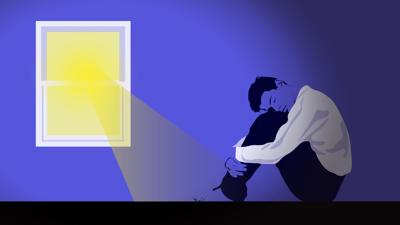Winter quarter can be rough. With most classes online and sunset at 4 p.m., many students are struggling with feelings of depression. Seasonal depression, also known as seasonal affective disorder (SAD), is something many of us know about, and it turns out that it can be easier to treat than previously thought.
Scientists are unclear on the exact causes of seasonal depression, but they believe that it has something to do with the biological clock.
“When we have less exposure to sunlight, what happens is that our biological clocks tend to shift, and those clocks do all kinds of things, including regulating our mood, regulating sleep, regulating hormones,” Kristen Lindgren, professor in the department of psychiatry and behavioral sciences in the School of Medicine, said. “So this kind of shift can have an impact on moods.”
In addition to the biological clock, neurotransmitters such as serotonin may also have an effect on seasonal depression. According to Lindgren, sunlight helps regulate serotonin; with less sunlight, the body produces less serotonin, and this can pose problems for people that have lower levels of it in their bodies. This can make them more prone to seasonal depression or intensify mood changes as the seasons change.
The biggest problem with seasonal depression is the lack of sunlight, but there are artificial ways to combat this. Light therapy, also known as phototherapy, uses a lamp that mimics daylight and substitutes the sun in the darker winter months. These lamps can range from 2,500 lux to 10,000 lux and provide concentrated light to help boost a person’s mood. Stronger lamps need to be used for 15-30 minutes a day and only require the person to be in the same room.
While these lamps are a good solution, they can be expensive. However, there are a lot of other promising options to combat seasonal depression that don’t require spending money.
One of the best things to do is go outside, especially if the weather is nice. It can be annoying to put on a rain jacket and walk in the rain, but being outside helps increase the serotonin needed to combat the long and dark days.
Another solution to combat seasonal depression is shifting your daily schedule to the daylight hours. Going to bed and waking up earlier will give you more time with natural light and could decrease the negative emotions that come with the seemingly perpetual darkness.
Another tip is to make sure that you are able to connect with other people and do the things that bring you joy. This could mean picking up a new hobby or doing something that makes you feel rewarded in the end.
According to Lindgren, having compassion for yourself is also an important step; understanding that these feelings are a natural occurrence and remembering to be kind to yourself is extremely beneficial. Understand that these feelings will pass and try to cope the best you can until the sun shines again in the spring.
Reach writer Taylor Bruce at arts@dailyuw.com. Twitter: @Tay1or_marie9
Like what you’re reading? Support high-quality student journalism by donating here.




(0) comments
Welcome to the discussion.
Log In
Keep it Clean. Please avoid obscene, vulgar, lewd, racist or sexually-oriented language.
PLEASE TURN OFF YOUR CAPS LOCK.
Don't Threaten. Threats of harming another person will not be tolerated.
Be Truthful. Don't knowingly lie about anyone or anything.
Be Nice. No racism, sexism or any sort of -ism that is degrading to another person.
Be Proactive. Use the 'Report' link on each comment to let us know of abusive posts.
Share with Us. We'd love to hear eyewitness accounts, the history behind an article.